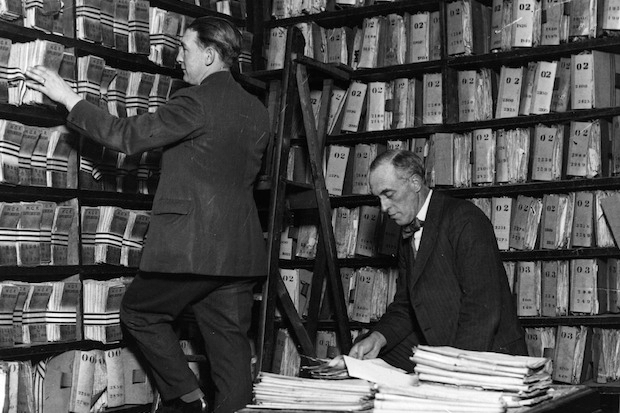The government could save £70 billion from the Whitehall spending bill by moving into a new digitised age. That’s the gist of a new report from Policy Exchange, detailing the amount of archaic waste that exists in the civil service. Some of the examples in the Smaller, Better, Faster, Stronger report are astounding — the Crown Prosecution Service prints one million sheets of paper every day. Two articulated lorries loaded with letters and paperwork drive into the DVLA every day.
Policy Exchange suggests many of these wasteful paper-based services could be taken to a central online location, aka the GOV.UK website. Bringing the government’s online presence into once place has been divisive. I think it’s a great example of how Whitehall can build a slimline product in no time at all, while Lloyd Evans believes it’s a great excuse to hide the details of what’s going on.
The Prime Minister’s ex-digital guru Rohan Silva has written the introduction to the report. He describes the battles this government has fought (and won) to push Whitehall into the 21st century:
‘Almost every inch of the journey towards a modern and transformative agenda for public sector IT was a huge struggle against inertia and bureaucratic opposition, which makes achievements like GOV.UK, the wonderful single portal for government, so spectacular. The fact that the UK is now the world leader in open data, from a standing start in 2010, is also incredible to behold.
‘However, the march of technology is relentless, and having fought so hard to overcome the old public sector IT orthodoxies, we must not ourselves become deaf to the new heresies that ought, in time, to supplant our current thinking. That is why Policy Exchange’s work in this area is so vitally important – it will help ensure that this Government, and future Governments, are exposed to new provocations and ideas, and continually pushed to make public sector IT even more efficient, even more effective, and even more transformative for citizens.’
Policy Exchange suggests some easy wins, like accepting electronic proof of ID (instead of posting a P45) and and using a universal system for accepting online payments (like PayPal) as opposed to different systems for each department. Yet others, like creating a Linked In for the whole of the government and incorporating more digital training into the Civil Service competency framework, will take a huge shift in the way the civil service thinks and operates. Something that isn’t very easy for an organisation usually resistant to change.
But as Whitehall insider Sue Cameron described in the Telegraph last week, the report is a necessary rallying cry for Whitehall to reinvent itself for modern Britain. Francis Maude has made fantastic progress in streamlining many parts of the civil service, but there is certainly room for more improvement. Hopefully the Cabinet Office will listen to some of these ideas and implement (as a minimum) the easy ones before the next election.






Comments